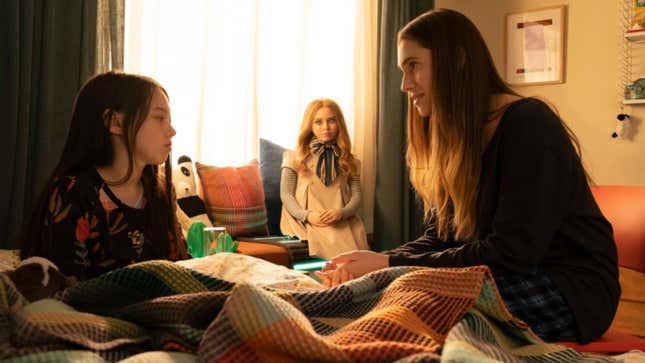‘Fleishman,’ ‘M3GAN,’ and the Absurdity of Intensive Mothering
Women reach their breaking points—noisily and destructively—in Fleishman Is in Trouble and M3GAN.
In Depth

In a scene of Hulu’s Fleishman Is in Trouble that practically won Claire Danes a Golden Globes nomination on its own, Rachel Fleishman lets out a galaxy-ripping scream during a yoga retreat with her lover. She screams for an impressive 85 seconds, her face expanding into a black hole of rage, her skin flushing into a reddish hue, with anguish and catharsis pulsing through every decibel pouring out of her throat. Through it, she expels all of the pent up shit that’s been weighing on her for more than a decade.
We’re already seven episodes deep into the novel-turned-limited-series, and yet this is the first time we’re seeing things from Rachel’s perspective. For the six episodes before that, the audience has listened to Rachel’s ex-husband, Toby (Jesse Eisenberg), endlessly slander his former spouse for all the ways she’s failed as a wife, as a mother, and as a life partner. Her sudden disappearance, which has left him as their two young kids’ primary caretaker, only exacerbates this. Like any sympathetic viewer—guided by the show’s equally sympathetic narrator, Libby Epstein (Lizzy Caplan)—I’ve been on Toby’s side up until now, watching as he’s struggled with the parenting woes that mar the Upper East Side’s wealthiest: ushering his kids from 92Y summer camp to Broadway shows to the Hamptons and back. And just like Toby, I’ve become convinced that Rachel is the epitome of evil, having spent more than a decade doggedly running her talent agency at the expense of her family’s true happiness, which she’s taken a backseat in trying to achieve—the worst thing a mother could ever do.

These sound like rich people problems—and they definitely are! Roll your eyes! But Rachel’s predicament also shows us a mothering experience recognizable to most moms. In the scream that ends all screams, we’re finally told a different story about Rachel, one that illustrates the extent of her exhaustion and anxieties as a working mother, caged in on all sides by what scholars call “intensive mothering.” Coined by scholar Sharon Hays in 1996, intensive mothering is a child rearing philosophy in which mothers are made to “take all the responsibility for managing, thinking, and organizing their children’s lives,” Dr. Lynn O’Brien Hallstein, a scholar of contemporary motherhood at Boston University, told Jezebel. This doesn’t mean just shuttling them off soccer practice. It means “making sure that your child is in an elite soccer program so that they can be successful, and it will help with their college app.”
Prior to this, Hallstein says that we as a society embraced a model known as “flower pot” mothering, wherein the general understanding was that you “give the children water and the basic resources they need, and they’ll grow up healthy.” But apparently, watering kids just wasn’t enough. And if mothers weren’t already struggling to selflessly embody the weight of parenthood before, they sure were after the world shut down. “We asked them to do even more, not less,” Hallstein said. With the weariness of an entire global pandemic reaching its third year, intensive motherhood—in all of its thankless glory—has rightfully inspired a couple recent works that illuminate the absurdity of just how much we expect from mothers. “Mothers are at a breaking point,” Hallstein said.
-

-

-

-

-

-

-

-

-

-

-

-

-

-

-

-

-

-

-

-

-

-

-

-

-

-

-

-

-

-

-

-

-

-

-

-

-

-

-

-









































